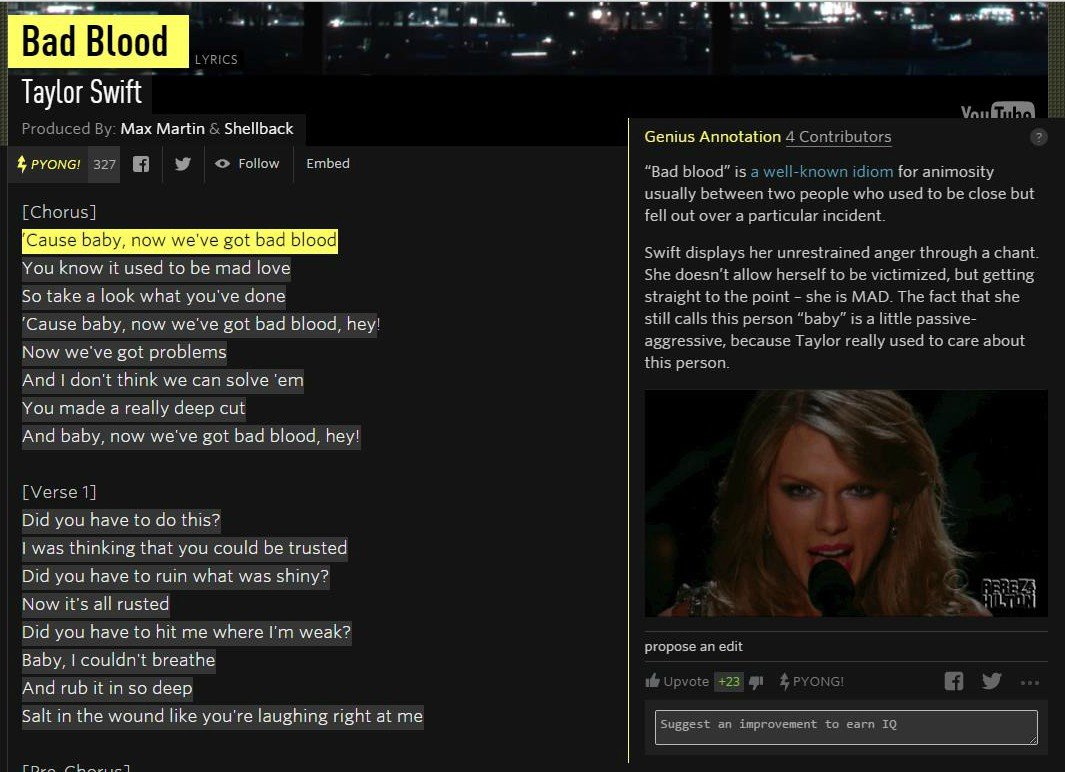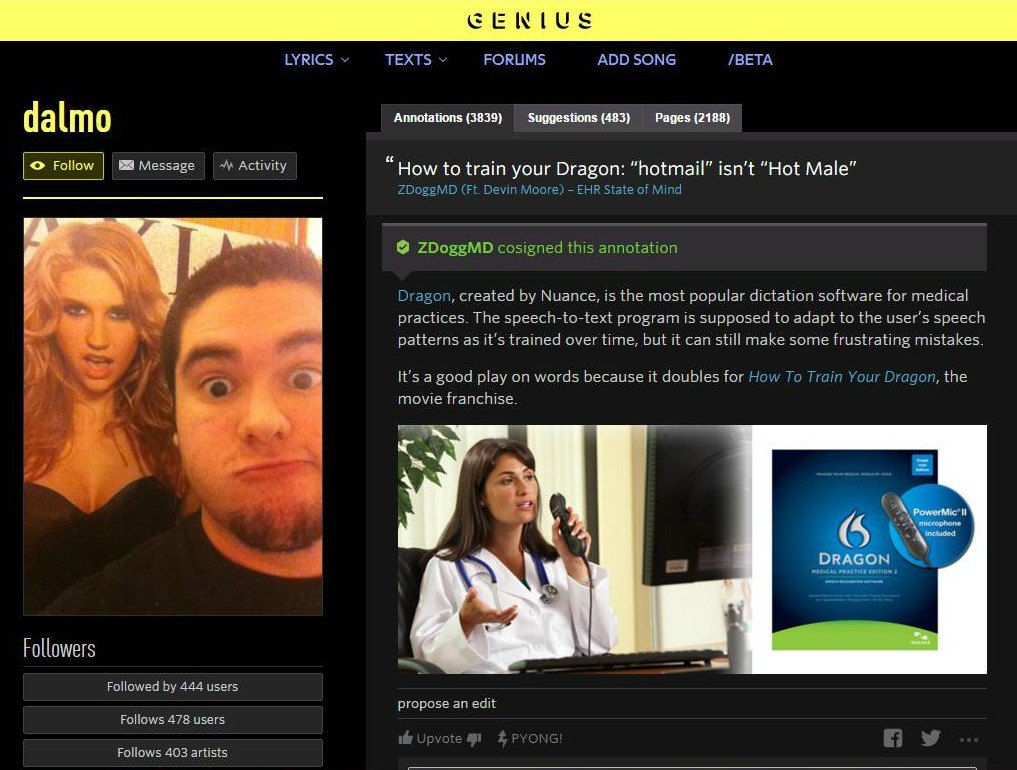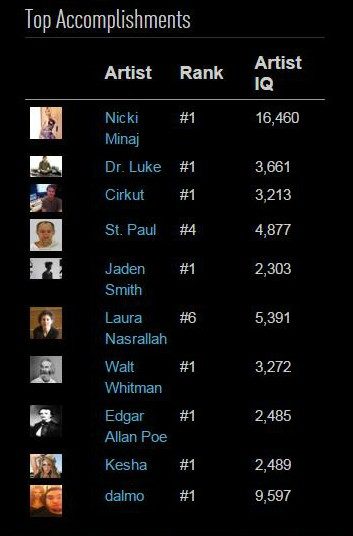Genius: Annotating the World, One Rap at a Time
Genius has leveraged a strong community management system and passionate fan base in its aim to "annotate the web". Whether they will be successful will depend on how they cross the chasm while maintaining its core brand.
“Started From the Bottom Now We’re Here”
Rap Genius began in 2009 with the lofty goal of informing and interpreting the meaning behind rap lyrics. The platform has grown rapidly through crowdsourcing, naturally expanding to different music genres. In 2014, the company rebranded itself to Genius and officially announced the expansion to multiple types of content, including poetry, literature, and news.
The beauty of Genius is in the breadth of content. It’s easy to find oneself going down the proverbial rabbit hole, initially perusing the meaning behind Walt Whitman’s “Song of Myself” and ending up studying the infamous Nas diss track of Jay-Z. Artists and celebrities themselves have even contributed to the content as “verified contributors”. For example, actress and writer Lena Dunham annotated a chapter of her new book on Genius to promote its release.
“Lemme Upgrade U”
Users are incentivized to contribute in three main ways:
- User interface that dramatically simplifies the annotation process: Genius has developed a robust annotation technology that allows users to easily add text and rich media to any portion of the content and edit existing commentary. The site also keeps track of the various contributors and the amount contributed by each. The degree to which Genius has focused on an intuitive user interface is so acute that they created keyboard shortcuts to make the editing process even easier. In 2015, Genius developed and launched a beta version of a browser tool to allow users to annotate any page across the web.
- Proprietary points system called “Genius IQ”: The IQ points system creates an engaging gamification layer to the site. Contributors are awarded or deducted points in different amounts for interactions ranging from adding a profile picture to getting an annotation rejected by the community. The number of IQ that the user has demonstrates to site visitors the level of expertise or “genius” that the user has on certain subject matter. Moreover, designated content can only be “unlocked” to be annotated by individuals who have earned a certain number of IQ.
- Social networking among community: The platform also capitalizes on network effects through social networking features akin to Facebook. Each registered user automatically is provided a profile page that displays the user’s picture, most recent contributions to the site and “top accomplishments” table displaying the top artists for which the user has the most “IQ” and the user’s rank within the community for each artist. Users can also more passively interact on the site by “upvoting” or “downvoting” annotations based on their quality. There are also dozens of forums categorized based on geography (i.e., Genius France) and subject matter (i.e., History Genius).
Contributors are managed primarily by the community through a leveling system controlled by the company: editors, mediators and moderators. Editors are contributors who have consistently created “high quality” content on the site and are given the ability to curate annotations. Similarly, mediators are chosen as quality gatekeepers of the forums. Moderators, who have increased ability to manage the overall community, are chosen among editors based on their content quality and ability to “inspire and coach other contributors”.
“Mad Love” or “Bad Blood”?
Genius’ value capturing strategy remains to be seen, as the company does not generate significant, if any, revenue. Advertising is one potential source while others have suggested licensing its annotation tool as enterprise software, which seems feasible though potentially contradictory to the site’s offbeat branding.
Expansion of its content is another hurdle. Lyrics continue to remain the major source for the site’s 3-4MM monthly unique visitors. While lyrics are good SEO bait, Genius will only have lasting power if it continues to diversify its subjects and increase its audience. Its new annotation web tool certainly provides a way for Genius to exponentially grow its content and user bases but also increases the threat of copyright issues. Genius may be able to overcome this through some type of revenue sharing from directing traffic to other pages could be one way, but again, it would need to be quick in launching a monetization strategy. The tool will only become potent once Genius can find partnerships to embed itself seamlessly onto the various sites.
To grow into its valuation, which is rumored to be in the hundreds of millions, and appeal to the masses, Genius will have to skirt a thin tightrope of tightening its community management system to be more vigilant about offensive material while maintaining its brand and sense of humor. It may even have to turn initially to a traditional media company by originating more content alongside its crowdsourced content.






Well written post! I’m personally excited about Genius simply because of all of the different directions the company could ultimately take. The copyright issue remains a huge threat, but I see Genius as a potential source of “CliffsNotes” for all kinds of digital content. If Genius could do this for popular news articles and current events and even start to curate that to individual users’ particular tastes, it would be a powerful one-stop source for various types of information that could be digested very quickly. However, this could also be interpreted as something quite different than Genius’ core brand, and could require the company to distance itself from that to attract broader appeal – as you suggest.
I love Genius! I was surprised to learn how low their monthly unique numbers were, as I was under the impression that lyric searches on Google account for a fairly significant percentage of all searches. If Genius can be the top or near top result for these searches, that’s a massive user funnel for Genius. I am also very surprised that they haven’t been using advertising. This is how the other lyric sites make their money, so it’s not like users are expecting something else. Genius could even do it in a classier way than the clickbait ads on the other sites.
Having artists themselves annotate is a great feature (reminds me of Jay Z’s Decoded book), though I wonder how much value the artists see from this. How does Genius go about convincing them to participate? The annotations by the crowd of users, in my experience, are already pretty high quality. People know a lot about their favorite artists and their references, and are proud to display that knowledge through the IQ score you mention.
I hope this site stays around, because diving into the meaning behind lyrics is definitely more engaging (from a time-on-site perspective) than simply displaying the lyrics. I wonder if Genius could partner with content platforms like YouTube, Spotify, etc. to provide this content as well. Spotify has integrated lyrics into their product as well, not sure how many people use that feature or not…
This is a great post! I agree with Jeff’s points above around having artists themselves engage in “grading” the annotations to improve user engagement. I wonder if Genius could partner with iTunes to feature an artist’s tracks and easily link to purchase in order to incentivize an artist to take the time to engage with the platform. On the user side, I could see Genius potentially holding some type of limited time competition encouraging users to submit annotations, where the selected winner by the artist gets a different Genius IQ prize badge or something similar to help indicate their strength on the platform. In terms of other partnerships, I wonder if even forming relationships with websites such as lyrics.com and others could be a good starting point for Genius IQ to improve its brand recognition and improve its SEO rankings via increased links from trusted websites.
Big user of Genius! I am an avid hip-hop fan and have used Genius countless times.
With regards to music, I think that Genius should try and push fan to artist engagement further on the platform. I think it would create a ton of value for fans if the platform created a Reddit-esque “AMA” forum where fans could ask their favorite artists questions about the lyrics behind their songs. I think that this can be pitched to artists as a unique way to really connect with their loyal fans and can be used to promote and push their albums/singles.
I am a little wary that Genius gets pigeon-holed in music and struggles to expand into other forms of annotation given the eccentricity of the site’s founders (one of whom left the company given his tasteless remarks on the memoir of the mass murderer Elliot Rodger) and the several scandals the company has been involved in including being temporarily demoted in Google’s search results for using link spam to improve its rank. Nevertheless, if the company can get its act together, which it appears it has in the past year, I believe the sky is the limit for this company as annotating the web has immense growth potential.